
How Prepared Are You to Support Someone at the End of Life?
Jan 20, 2025
How Prepared Are You to Support Someone at the End of Life?
Death is a universal experience, yet it remains one of the most misunderstood and feared aspects of life. For centuries, it was regarded as a sacred rite of passage, deeply integrated into the fabric of communities. Today, however, our modern society often isolates death, treating it as a medical problem to be solved rather than a natural part of life. This shift has left many of us unprepared to support loved ones at the end of life, perpetuating fear and detachment. Let’s explore how we lost our way, and how reclaiming the truth about death can empower us to live fully and support others with compassion.
Rediscovering the Sacredness of Death
Historically, death was a communal event. Family members cared for their loved ones at home, and rituals provided comfort and meaning to those grieving. Over the last century, however, the rise of modern medicine has removed death from the home and turned it into a medicalized experience. Doctors, often trained to save lives at all costs, are now expected to fix what is unfixable. This shift has created a disconnect, leaving families unprepared for the realities of end-of-life care and perpetuating a fear of the unknown.
The language we use to discuss death further fuels this fear. Phrases like “losing the battle” against cancer frame death as a failure rather than an inevitable part of life. Similarly, the misconception that there is “nothing more to be done” overlooks the profound ways we can support someone at the end of life, including symptom management, emotional support, and honoring their wishes. By reframing our perspective and embracing death as a natural process, we can reduce fear and provide meaningful care.
Understanding the Roots of Fear
Fear of death often stems from early experiences and cultural conditioning. Many adults recall being shielded from death as children, creating confusion and trauma around the subject. When families avoid discussing death or use euphemisms like “sleeping,” they inadvertently reinforce fear and misunderstanding. Additionally, modern society’s focus on youth and longevity has stripped death of its sacredness, turning it into a hidden, taboo topic.
To address this fear, we must examine our beliefs and experiences. Reflecting on questions such as, “What was my first memory of death?” and “What fears do I associate with it?” can help uncover the roots of our anxiety. Common fears, including the fear of pain, separation, or unfinished business, can be alleviated through education and open conversation. As death doulas and other end-of-life professionals have observed, acknowledging and discussing these fears can transform them into acceptance and peace.
The Power of End-of-Life Education
When we bring death back into the fold of life, we reclaim its sacredness and its role as a teacher. End-of-life professionals often witness profound moments of clarity, connection, and peace as individuals approach death. Many share universal themes of unconditional love, spiritual oneness, and forgiveness, regardless of cultural or religious background. These insights remind us that death, far from being a loss, can be a transformative experience for everyone involved.
To support someone at the end of life, practical education is essential. Understanding the dying process, recognizing signs of transition, and knowing how to provide comfort are critical skills that anyone can learn. Hospice and palliative care teams, as well as death doulas, offer invaluable guidance, but families must also take responsibility for preparing themselves. By learning these skills and fostering open communication, we can ensure that end-of-life experiences are filled with dignity, love, and compassion.
Click here to register for our free Doulagivers Level 1 End of Life Doula Training
Conclusion
Death is not a medical experience; it is a human one. By acknowledging this truth and embracing death as a natural part of life, we can reduce fear and empower ourselves to provide meaningful support to those we love. Reclaiming the sacredness of death also enriches our lives, encouraging us to live each day with presence, gratitude, and purpose. Together, let’s bring back the sacred, natural experience of death and create a world where no one faces this journey unprepared or alone.
Additional Resources:
The Good Death Book, now available for pre-order
To listen to the full Ask a Death Doula Podcast episode on Youtube, click here.
This 90-minute webinar training is the best way to learn the essential skills to care for someone who is dying based on the Doulagivers 3 Phases of End of Life Model of Care.
Join the Movement, Learn the Skill, Change the World!
Need help with something else? Send us an email to [email protected]


